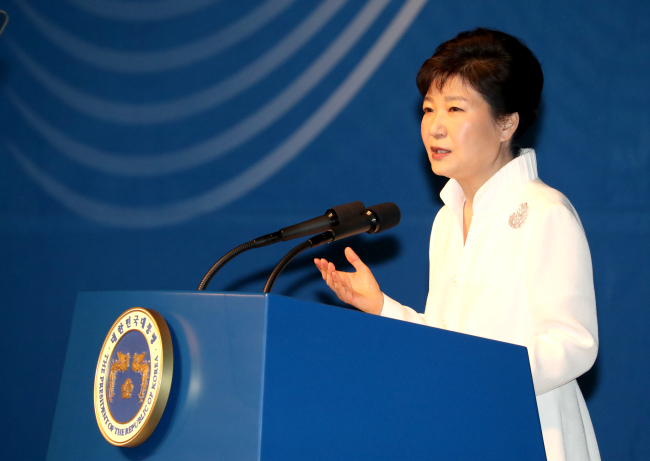President Park Geun-hye on Monday renewed her calls for North Korea to "immediately" cease its nuclear program and threats of provocations, saying its saber-rattling would only aggravate its isolation and economic travails.
During a speech to mark Liberation Day, Park also defended the planned deployment of an advanced U.S. antimissile system as a "self-defense" measure to protect the nation from Pyongyang's "reckless" provocations, stressing that the plan must not be politicized.
"I urge (North Korea) to immediately stop developing nuclear and other weapons of mass destruction, and halt its threats of provocations against South Korea," she said during the ceremony in Seoul to mark the 71st anniversary of Korea's liberation from Japan's 1910-45 colonial rule.
"Any attempt at threatening our people and the Republic of Korea will never succeed."
 |
S.Korean President Park Geun-hye (Yonhap) |
Park also pressed the communist regime to improve its abysmal human rights situation, saying that Pyongyang must not turn a blind eye to its people's right to enjoy fundamental human rights.
"We will not ignore the misery of North Koreans now in pain due to the North Korean authorities' wrong choices," she said. "We want North Korea to become a normal member of the international community that respects the universal rights of mankind, and international obligations and norms."
The chief executive then pointed out that "should Pyongyang make the right decision and come out with sincerity," Seoul will offer to the impoverished state an opportunity to move in the direction of peace and co-prosperity.
Park also used her speech to urge North Korean elites and ordinary people to join Seoul's efforts to lay the groundwork for national reunification.
"Unification will provide a new opportunity, with which all can be treated equally without discrimination and disadvantages, and can pursue their happiness while realizing their full potential," she said.
Apparently alluding to the mounting criticism of the planned deployment of the Terminal High Altitude Area Defense system to the peninsula, Park reiterated that should there be an alternative to THAAD, one should propose it.
It is the latest in a recent series of her statements to defend the plan by Seoul and Washington to station a THAAD battery in the southern town of Seongju by end-2017. Critics have called for a withdrawal of the decision, saying it would pose health risks to residents in Seongju, and strain ties with China and Russia.
Commenting on the volatile regional security landscape, the president highlighted the importance of "strategic and creative thinking," while urging the nation to remove the idea that the fate of South Korea will be determined by the power dynamics among great powers.
"Today's international politics and shifts in the security landscape in Northeast Asia call for our extraordinary response, and our strategic thinking and marshaling of our capabilities are more crucial than ever before," she said.
"We need to lead relations with neighboring countries in an active and mutually beneficial way, believing that we play a leading role for peace and prosperity on the peninsula and in Northeast Asia."
In a sign of an improvement in the relations between South Korea and Japan, Park did not issue any strongly worded statement regarding the two countries' shared history. But she said the countries should strive to forge a future-oriented relationship while "squarely facing history."
On the back of last year's deal to settle the issue of Japan's wartime sexual enslavement of Korean women and the shared recognition of the need to cooperate to counter Pyongyang's military threats, diplomatic tensions between Seoul and Tokyo have been on the steady decline.
During her speech, Park also made an appeal for the National Assembly to pass a set of bills aimed at reforming labor markets, stressing that labor reform is an undertaking related to "national survival."
The set of bills on labor reform have been at the core of government efforts to tackle youth unemployment and prop up economic growth. But the bills have languished in the legislature with critics arguing they would undermine the quality of employment and "polarize" the labor markets.
Park also called on local businesses to step up efforts to nurture new industries and create jobs, while reiterating that her government will support them through various efforts, including sweeping deregulation. (Yonhap)








![[Today’s K-pop] Blackpink’s Jennie, Lisa invited to Coachella as solo acts](http://res.heraldm.com/phpwas/restmb_idxmake.php?idx=644&simg=/content/image/2024/11/21/20241121050099_0.jpg)